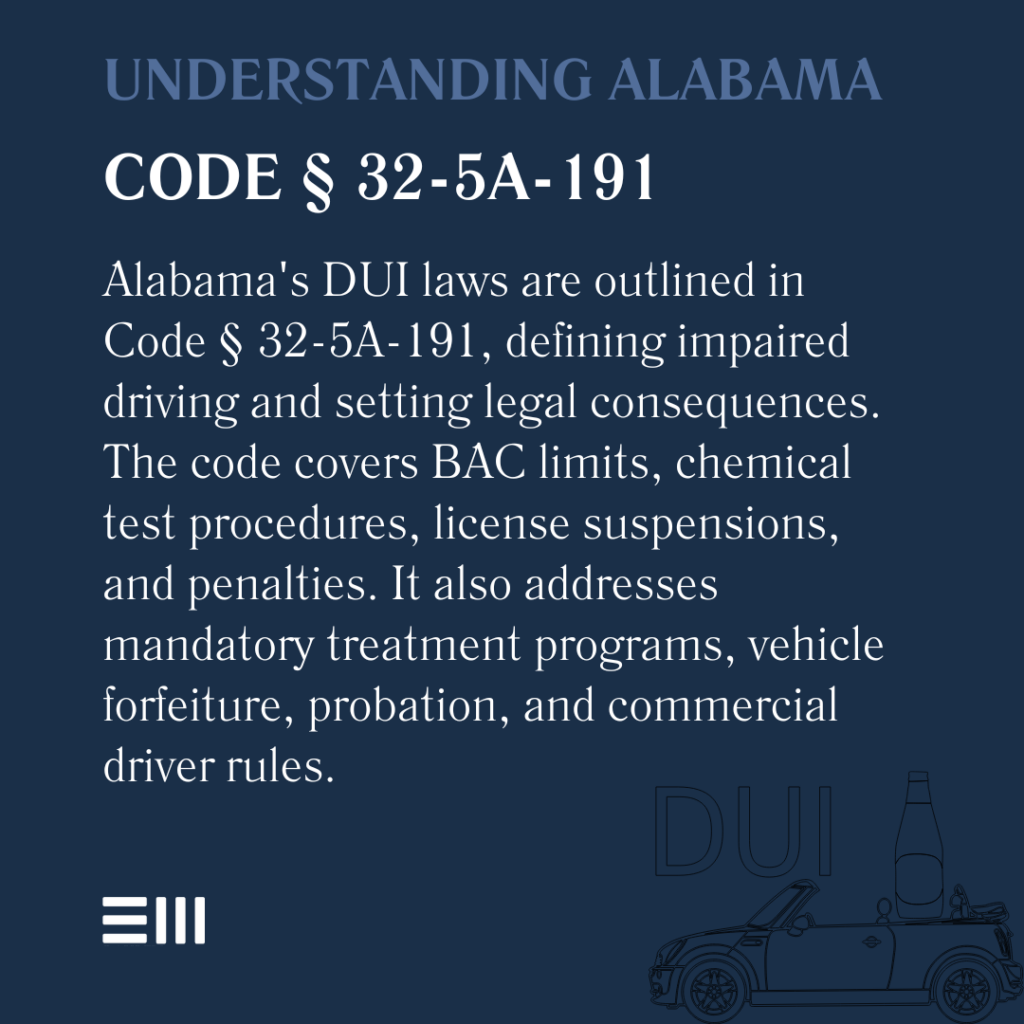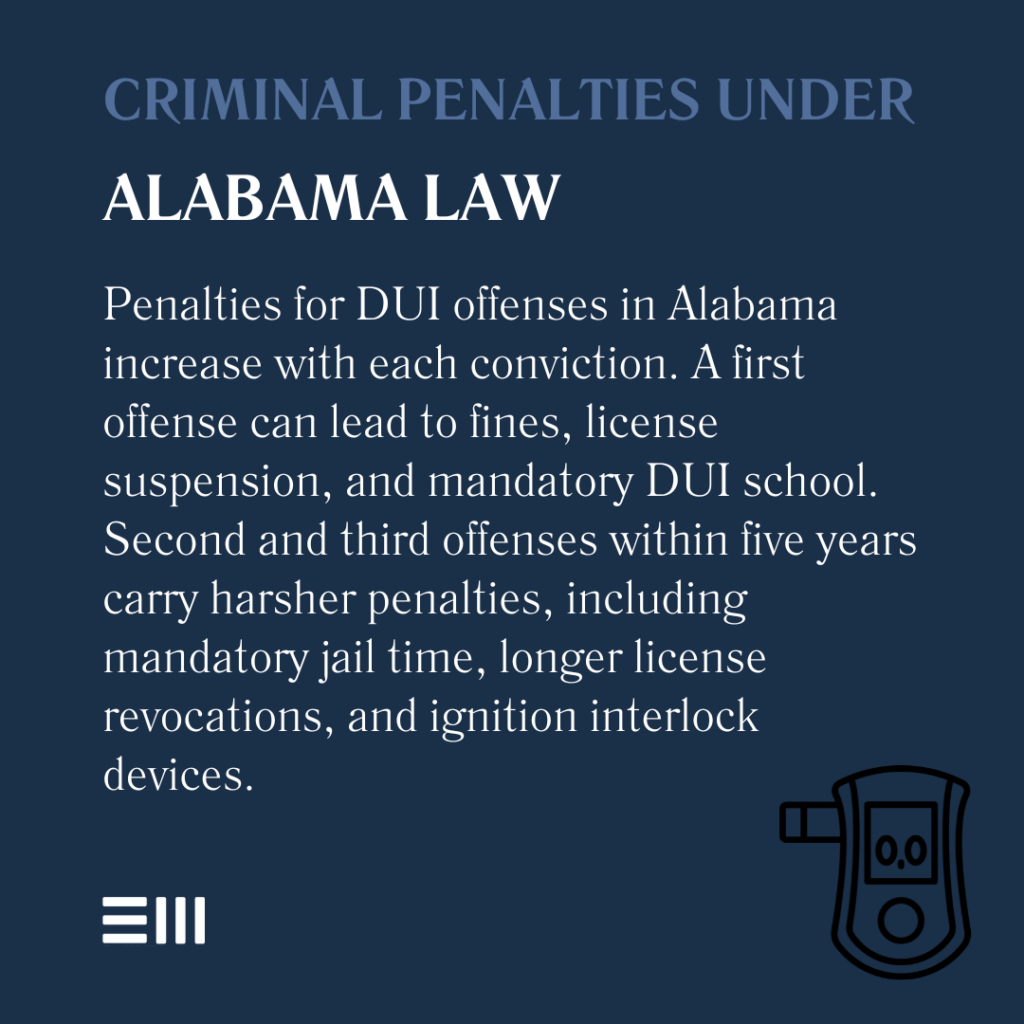
The moment red and blue lights flash in your rearview mirror can change everything. Within seconds, questions flood your mind: What are my rights? What penalties might I face? What steps should I take next?
Alabama’s DUI laws shape these crucial moments and their aftermath, determining the path forward for thousands of drivers each year.
From roadside stops to courtroom proceedings, understanding these laws becomes your first line of defense in protecting your future.
Understanding Alabama Code § 32-5A-191
The Alabama Code § 32-5A-191 establishes the framework for DUI enforcement and prosecution throughout the state. This section defines impaired driving and sets forth the following legal consequences, serving as the cornerstone of the state’s efforts to maintain safe roadways while ensuring due process.
Key elements of Alabama’s DUI code include:
- Blood Alcohol Concentration (BAC) limits;
- Chemical test requirements and procedures;
- License suspension periods and conditions;
- Criminal penalties and enhancements;
- Mandatory treatment programs;
- Insurance requirements and restrictions;
- Commercial driver provisions and limitations;
- Implied consent rules and consequences;
- Aggravating circumstances;
- Vehicle forfeiture conditions;
- Probation requirements; and
- Alternative sentencing options.
These provisions work together to create a comprehensive approach to preventing and addressing impaired driving across Alabama’s roads and highways.
Understanding each component helps drivers navigate both the criminal justice system and administrative procedures.

Blood Alcohol Concentration Limits
Understanding BAC limits helps drivers make informed decisions and recognize when they might be at risk of violating Alabama law.
The state maintains strict standards for alcohol concentration, with different thresholds applying to various categories of drivers and circumstances.
Alabama recognizes these BAC thresholds:
- 0.08% for regular drivers operating private vehicles;
- 0.04% for commercial drivers in any commercial motor vehicle;
- 0.02% for drivers under 21 (Zero Tolerance Law);
- 0.15% triggering enhanced penalties and mandatory jail time;
- Any detectable amount while on probation for prior DUI;
- Presence of controlled substances or illegal drugs;
- Combined alcohol and drug presence;
- Observable impairment at any BAC level;
- Professional license considerations; and
- Out-of-state driver implications.
These limits reflect scientific research on impairment and align with national safety standards for roadway operation. Each threshold carries specific implications for prosecution and penalties.
Criminal Penalties Under Alabama Law
Alabama takes DUI violations seriously, with penalties increasing for subsequent offenses.
Understanding potential consequences helps drivers appreciate the gravity of impaired driving decisions and the importance of proper legal representation.
First Offense Penalties:
- Up to 1 year in jail with minimum 24 hours;
- Fines $600 to $2,100 plus court costs;
- 90-day license suspension with restrictions;
- Mandatory DUI school completion;
- Possible ignition interlock device installation;
- Court costs and program fees;
- Insurance increases and SR-22 filing;
- Probation requirements;
- Community service options;
- Victim impact panel attendance;
- Substance abuse evaluation; and
- Monthly supervision fees.
Second Offense Penalties (within 5 years):
- 5 days to 1 year in jail (mandatory);
- Fines $1,100 to $5,100 plus court costs;
- 1-year license revocation without exceptions;
- Mandatory ignition interlock for 2 years;
- Substance abuse evaluation and treatment;
- Community service requirements (minimum 30 days);
- SR-22 insurance filing for 3 years;
- Extended probation supervision;
- Regular drug and alcohol testing;
- Vehicle registration consequences;
- Occupational license restrictions; and
- Treatment program completion.
Third Offense Penalties (within 5 years):
- 60 days to 1 year in jail (mandatory);
- Fines $2,100 to $10,100 plus court costs;
- 3-year license revocation minimum;
- Extended interlock requirements (5 years);
- Mandatory treatment program completion;
- Felony status possible with priors;
- Vehicle impoundment or forfeiture;
- Lifetime license revocation possible;
- Enhanced supervision requirements;
- Restricted driving privileges;
- Mandatory substance testing; and
- Professional license implications.
These penalties demonstrate Alabama’s commitment to deterring impaired driving through progressively severe consequences. Courts maintain discretion within these ranges based on specific case circumstances.

License Suspension and Reinstatement
The Alabama Department of Public Safety handles license suspensions independently from criminal proceedings. Understanding this administrative process helps drivers protect their driving privileges and meet all requirements for reinstatement.
Steps for license reinstatement include:
- Completing full suspension period;
- Paying reinstatement fees ($275+);
- Providing SR-22 insurance certification;
- Completing court requirements fully;
- Installing required interlock devices;
- Passing substance screening tests;
- Attending mandatory classes;
- Clearing all holds on license;
- Providing proof of residence;
- Completing defensive driving courses;
- Meeting medical requirements; and
- Satisfying child support obligations.
Successfully navigating these requirements allows drivers to regain their driving privileges while demonstrating a commitment to safe operation. Each step must be completed in proper sequence.
Common Questions About Alabama’s DUI Code
Understanding Alabama’s DUI laws helps individuals navigate the legal system more effectively and make informed decisions about their cases.
Here are answers to some frequently asked questions about Alabama’s DUI code.
What Rights Do I Have During a DUI Stop?
Your constitutional rights remain protected during traffic stops:
- Right to remain silent;
- Right to refuse field sobriety tests;
- Right to contact an attorney;
- Right to refuse vehicle search;
- Right to refuse portable breath test;
- Right to polite treatment; and
- Right to record interaction.
Understanding and exercising these rights appropriately can significantly impact your case’s outcome.
How Does Implied Consent Work in Alabama?
Alabama’s implied consent law creates specific obligations:
- Automatic agreement to chemical testing;
- Administrative penalties for refusal;
- 90-day minimum suspension;
- Independent of criminal case;
- Limited appeal window;
- Specific testing procedures; and
- Medical exemptions possible.
These provisions form a crucial part of Alabama’s DUI enforcement strategy while protecting public safety.
What Factors Influence DUI Penalties?
Courts consider multiple factors when determining sentences:
- Prior convictions;
- BAC level;
- Presence of minors;
- Property damage;
- Injury to others;
- Cooperation level;
- Treatment participation; and
- Community impact.
Understanding these factors helps individuals and their attorneys develop appropriate defense strategies.
How Long Does a DUI Stay on My Record?
DUI convictions have lasting implications:
- Criminal record: Permanent;
- Driver’s license: 5 years;
- Insurance rates: 3-7 years;
- Employment checks: Varies;
- Professional licenses: Case-specific;
- Travel restrictions: Country-dependent; and
- Background screens: Lifetime.
These long-term consequences emphasize the importance of proper legal representation and defense.
Secure Your Rights and Future Today
When facing DUI charges in Alabama, having experienced legal representation can make the difference between severe penalties and a manageable outcome.
Our team of dedicated attorneys understands the complexities of Alabama’s DUI code and how to navigate its challenges effectively.
Let us help protect your rights and future. Our experienced legal team will:
- Analyze your case details thoroughly;
- Identify defense opportunities and weaknesses;
- Challenge evidence appropriately and effectively;
- Negotiate with prosecutors for optimal outcomes;
- Represent you in all court proceedings;
- Guide you through administrative requirements;
- Protect your driving privileges aggressively;
- Handle license suspension hearings;
- Coordinate with treatment providers;
- Manage court appearances and deadlines;
- Explore alternative sentencing options; and
- Protect your professional licenses.
Take control of your situation today.
Contact our office for a confidential consultation about your DUI case and learn how we can help defend your rights under Alabama law.
Can't find what you're looking for? Search our site below.










